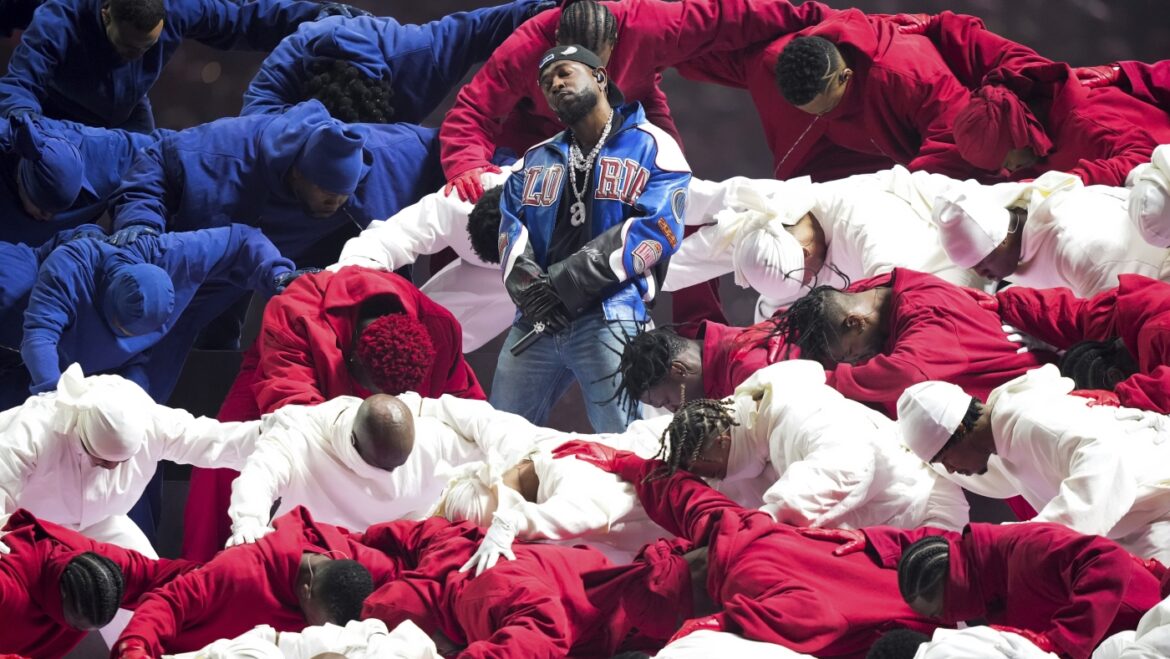Our Terms & Conditions | Our Privacy Policy
Opinion: ‘Music is spiritual,’ a Milwaukee artist’s take on Kendrick’s Super Bowl show
AD
 Kendrick Lamar performs during halftime of the NFL Super Bowl 59 football game between the Kansas City Chiefs and the Philadelphia Eagles, Sunday, Feb. 9, 2025, in New Orleans. (AP Photo/Matt Slocum). Shared via NPR.
Kendrick Lamar performs during halftime of the NFL Super Bowl 59 football game between the Kansas City Chiefs and the Philadelphia Eagles, Sunday, Feb. 9, 2025, in New Orleans. (AP Photo/Matt Slocum). Shared via NPR.
Kendrick Lamar just put on a masterclass of rap performance on Sunday (Feb. 9) for the Super Bowl LIX Halftime Show. And, while it undoubtedly cemented his victory in one of the most high-profile “rap beefs” in recent memory against fellow megastar Drake, more importantly, it brilliantly showcased an artist committed to and passionate about his craft and culture.
For me, personally, Kendrick is an artist who understands the assignment of being one, specifically a Black-American musical artist. Every few months, a meme of the famed Afrobeat pioneer Fela Kuti comes across my social media algorithm (in fact it did earlier today before I sat down to write this), and I always reshare it:
“Music is a spiritual thing; you don’t play with music.”
A more than decade-long cold war feud between Drake and Kendrick was reignited with Lamar’s verse on Future & Metro Boomin’s “Like That” back in March 2024, and now, almost a year from that seismic drop the diabolically, strategic onslaught from “Mr. Morale” shows no signs of stopping. This halftime show was one of many infinity stones in his gauntlet: HBCU marching bands cutting up this past season to “Not Like Us” was another; the “Pop Out”; the five Grammys for a diss song just a week prior. From purely an entertainment standpoint, this will easily go down as one of the most storied years in Hip-Hop history.

Through the lens of art and performance, and the emotional historical work that is being an artist, there has not been a better purveyor of the passionate spirit and rich history of Black music at a mainstream level than Kendrick Lamar for decades. When I think of the great artists that have most inspired me through the years –– Marvin Gaye, Stevie Wonder, Prince, Nina Simone, Public Enemy, A Tribe Called Quest, etc. –– these artists used their gifts and their platform to progress not only the craft, but the culture. They exhibited, uplifted, and personified a pride and awareness of their Blackness through song and performance.
Kendrick Lamar is in a lineage of those greats.
From the opening of “wacced out murals” and our intro with “Uncle” Samuel L. Jackson, to the end of “TV Off” with the image of GAME OVER flickering in the darkened stands, I was quite literally on the edge of my seat, completely immersed in the theater and beautifully-executed production of it all. Kendrick Lamar is a raw, vulnerable, and methodical griot; and while some of his deep storytelling cuts were not present in this particular production, the narrative elements still rang clear, concise, and emphatically: We’re all a part of the G.A.G. (Great American Game).
You either move with that awareness combatting the chaos with intention, vulnerability and integrity OR you succumb to the numbing comfort and willful ignorance that comes with being complicit in it. Beyond the petty and trivial jabs of their battle, this fundamental understanding was the core of what put the two generational talents at odds. Those “like us” understand the gravity of our reality and the socioeconomic pressures that create powerful acts of resistance, and those “not like us” are content and complicit with the parameters set forth by the powers that be.
‘We’re all a part of the G.A.G.
(Great American Game).”
What I witnessed this past Sunday was a galvanizing display of artistry from someone who understands both the sport of rap (how fitting for this to all take place on the field), and the value of its cultural currency within our own community and the world at large. This was always bigger than a rap beef. This warring of words highlighted our differences in the Black American experience not to divide, but rather to invite us all to hold ourselves accountable and committed to awareness, growth, vulnerability, and progress.
The halftime show set that invitation within a meticulously-produced 13-minute masterpiece of rap theatre, in front of the largest Super Bowl viewing audience ever (133.5 Million!). Go to the comment section of any piece about the halftime show, and the polarized reactions affirm and clearly delineate those that are “us” and those who are, in fact, not like “us.” We like Drake with the melodies, but it takes more than that to elevate the Black American experience.
Kellen “Klassik” Abston is an award-winning Milwaukee-based performing artist and musician who has never written an op-ed before this one. He opened for Kendrick Lamar in 2013, and is pretty great at rapping himself.
AD
[ad_1]
Images are for reference only.Images and contents gathered automatic from google or 3rd party sources.All rights on the images and contents are with their legal original owners.
[ad_2]



Comments are closed.